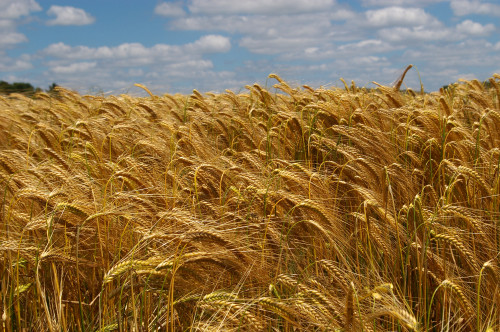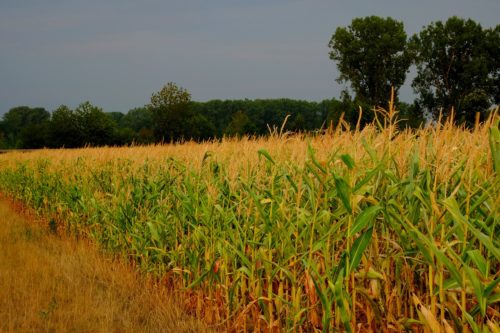TWH — This week, many modern Pagans, Heathens and polytheists are observing the summer festival of Lughnasadh, also called Lammas, Lughnassa, and Harvest Home.
Typically celebrated on Aug. 1, Lughnasadh is one of the yearly fire festivals and marks the first of three harvest celebrations. It traditionally honors Lugh, the Celtic god of light and many talents, and his foster-mother, Tailtiu.

[Sybarite48, Flickr/CC.]
There are many other late summer religious and secular holidays around the world, some of which are related to the harvest.
In Tibetan Buddhism, for example, followers celebrated Choekhor Duechen, or the first turning wheel of Dharma, July 27. The day marks the time when “the Buddha Shakyamuni first taught the four noble truths in Sarnath, India, and first turned the wheel of the dharma.”
During this time, members of several Native American nations celebrate the Green Corn festival. This was particularly true of “Cherokee, Creek, Choctaw, Chickasaw, Seminole, Timucua, and others, who used corn (maize) as their single most important food source.” The ceremony and festival, also called puskita or busk in English, was “an expression of gratitude for a successful corn crop.”
In the Southern Hemisphere, Pagans, Heathens and polytheists are readying for Imbolc, and other holidays focused on late winter and the coming potential of spring.
The first Monday of August is a holiday in most of Canada; the actual purpose varies from province to province, but it’s most commonly known as “Civic Holiday” there. Commerce Day, in Iceland, falls on the same day, which this year will be Aug. 6.
Perhaps the logical culmination of harvest celebrations is International Beer Day, which this year will fall on Aug. 3.
Here are a few recent quotes about the seasonal celebration:
“In modern times . . . it can also be a day to support local farmers. Let’s face it, they work their tails off to grow the food that appears on our tables. Perhaps we can use this holy day to commit ourselves to buying as much locally grown food as possible. I make a weekly trip to a tailgate market that is less than a mile from my house. It’s a wonderful opportunity for us urban dwellers to connect with our agrarian brothers and sisters. I always have wonderful conversations with the vendors there and I’ve learned a lot about how to cook the fruits and vegetables that are grown by them.” — David Taliesin
“What if the darkness was not an advent to be feared? What if the depression and mood disorders the darkness offers could be lined with hope other than logic and reason? In leaning into these ancient celebrations, I realize that while the light of the sun begins to wane, the celebration of fire rises up. Even as the sunlight’s moments draw shorter, the fire of the ovens and the forges blaze hotter and bake those tantalizing loaves. Without these fires, we could not transform our first fruits from raw ingredients into edible food — food that nourishes our bodies and our communities. Without these fires, we couldn’t invite our neighbors close to warm themselves, tell stories, sing songs, or share in warm spaces to sleep.” — Erin Thomas
“No matter where you live today is a day of rejoicing and celebration. In the Southern Hemisphere, you will start seeing signs of spring and warmer weather, while in the Northern Hemisphere it is time to start harvesting and getting things ready for the cold weather approaching.
“May your harvesting or getting seedlings ready to plant are blessed that you have enough for the cold months and what you sow bring you a bountiful harvest.
“Blessed be, dear brothers and sisters, all over our beautiful Mother Earth.” — Lady Beltane
“Irish playwright Brian Friel wrote the wonderful Dancing At Lughnasa, about the five Mundy sisters in their County Donegal cottage in late summer. They were all on the cusp of change. The narrator of the play tells us: ‘When I cast my mind back to that summer of 1936, different kinds of memories offer themselves to me. We got our first wireless set that summer. Well, a sort of set, and it obsessed us. We called it Lugh, after the old pagan god of the harvest, and his festival was Lughnasa, a time of music and dance.’ It’s an incredibly sad story, and it prods me to remember that today, on Aug. 1, I might believe that there’s a whole lot of summer left to be enjoyed, but it is slipping by fast. Change is imminent. Lughnasa’s climbing of mountains and lighting of fires was seen as a farewell to summer; the gathering in of fruits and flowers, the symbolic burying the first sheaf of the harvest – all of it was a practical and emotional means of preparing for the change to come.” — My Edinburgh Press

[Pixabay.]
The Wild Hunt is not responsible for links to external content.
To join a conversation on this post:
Visit our The Wild Hunt subreddit! Point your favorite browser to https://www.reddit.com/r/The_Wild_Hunt_News/, then click “JOIN”. Make sure to click the bell, too, to be notified of new articles posted to our subreddit.